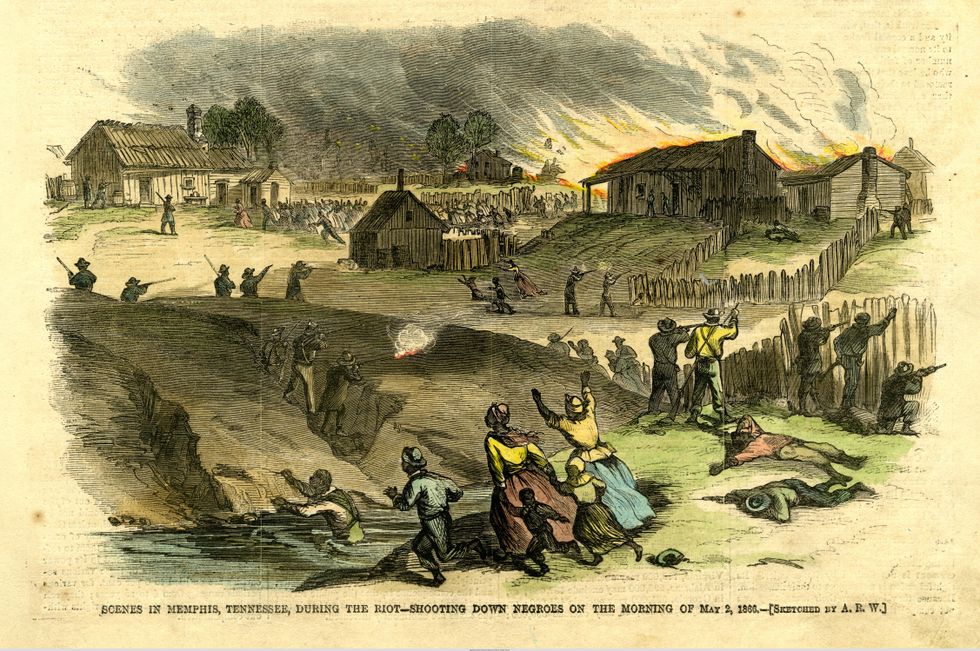Living in Memphis, Tennessee and surviving the 1866 Memphis Massacre, Frances Thompson summoned the bravery, courage, and resolve that ultimately made her an important figure of trans history and American history.
According to MLK50: Justice Through Journalism, Thompson was “born into slavery around 1840,” and experienced mobile disability. When the family that owned her was killed in the Civil War fighting for the South, she became free. Working for herself, she took in laundry, worked as a seamstress, and occasionally worked as a servant.
Tennessee ratified their state amendment ending slavery in February 1865, almost a month after the federal government. Rampant racism far outlived the amendment’s ratification, however, and upon the ratification of the Civil Rights Act of 1866, Memphis was one of many cities where it turned even more dangerous.

What became known as the Memphis Massacre, “the first large-scale racial massacre to erupt in the post-Civil War South,” according to the University of Memphis, occurred on May 1, 1866 and targeted Black communities like “Hell’s Half-Acre,” where Thompson lived on Gayoso Street, as MLK50 reported. The riot lasted three days as white men, including police, violently attacked, murdered, and burned Union Army soldiers, Black residents, and their homes. Sadly, Frances Thompson and her housemate Lucy Smith were among them, raped, beaten, and robbed by police. They couldn’t believe they survived.
Frances was brought in to testify before Congress, and she has since become acknowledged as the first transgender woman to do so. Part of her testimony can be read here courtesy of the organization Speaking While Female, which chronicles speeches given by great women leaders. Hearing her terrifying accounts of the evening, along with that of Smith and the other women who came forth, it moved listeners to make change. It wouldn’t have been easy to give such a testimony anywhere, especially not here, because their audience was “‘congressional leaders who were not necessarily sympathetic,’” as CNN quoted historian Hannah Rosen. But the testimonies from Thompson and her fellow witnesses ultimately helped push forward the 1866 passage and 1868 ratification of the 14th Amendment.

Thompson’s life didn’t get easier, unfortunately. Further federal amendments would not end the mistreatment of Black people in the South, Memphis included. Thompson’s life wound up entangled with the law as she was taken by police for “cross-dressing,” subjected to a doctor’s examination by force, and exposed as transgender. She was eventually sentenced to a male chain gang–“paraded through the city and humiliated,” CNN reported–and ultimately prison, where the negative attention continued. Some newspapers even tried to discredit her Congressional testimony, which had helped pass the 14th Amendment. Almost everything was taken from her home while she was imprisoned. Shortly after completing her sentence she passed away at approximately 36 years old.
Frances Thompson was remembered recently not just on CNN; but on the TransLash podcast, which includes a discussion with filmmaker Mickaela Bradford, who recently developed a short film about Thompson’s work entitled Under False Colors; a viral video on TikTok, where Kezia Williams, Chief Executive Officer and Executive Business Coach of business development initiative The Black upStart, discussed her history and honored her; and Harper’s Bazaar Italy, among others.
We’re living in a time where the federal government is attempting to erase transgender history from America’s present on an almost daily basis, which is not only vile, but has no basis in reality. Transgender people have always been part of America and American history–as Frances Thompson shows us. They built, fought, and died for this country, too, and far too often at its hands.


















 Rock deterioration has damaged some of the inscriptions, but they remain visible. Renan Rodrigues Chandu and Pedro Arcanjo José Feitosa, and the Casa Grande boys
Rock deterioration has damaged some of the inscriptions, but they remain visible. Renan Rodrigues Chandu and Pedro Arcanjo José Feitosa, and the Casa Grande boys The Serrote do Letreiro site continues to provide rich insights into ancient life.
The Serrote do Letreiro site continues to provide rich insights into ancient life.

 The contestants and hosts of Draggieland 2025Faith Cooper
The contestants and hosts of Draggieland 2025Faith Cooper Dulce Gabbana performs at Draggieland 2025.Faith Cooper
Dulce Gabbana performs at Draggieland 2025.Faith Cooper Melaka Mystika, guest host of Texas A&M's Draggieland, entertains the crowd
Faith Cooper
Melaka Mystika, guest host of Texas A&M's Draggieland, entertains the crowd
Faith Cooper


 It's a beautiful day outside Wrigley Field. | It's a beautif… | Flickr
It's a beautiful day outside Wrigley Field. | It's a beautif… | Flickr

 Selection from Magali Duzant's La vie is like thatMagali Duzant
Selection from Magali Duzant's La vie is like thatMagali Duzant Selection from Magali Duzant's La vie is like thatMagali Duzant
Selection from Magali Duzant's La vie is like thatMagali Duzant Selection from Magali Duzant's La vie is like thatMagali Duzant
Selection from Magali Duzant's La vie is like thatMagali Duzant Selection from Magali Duzant's La vie is like that featuring her father, Jean Gérard Benoît Duzant, as a young man.Magali Duzant
Selection from Magali Duzant's La vie is like that featuring her father, Jean Gérard Benoît Duzant, as a young man.Magali Duzant